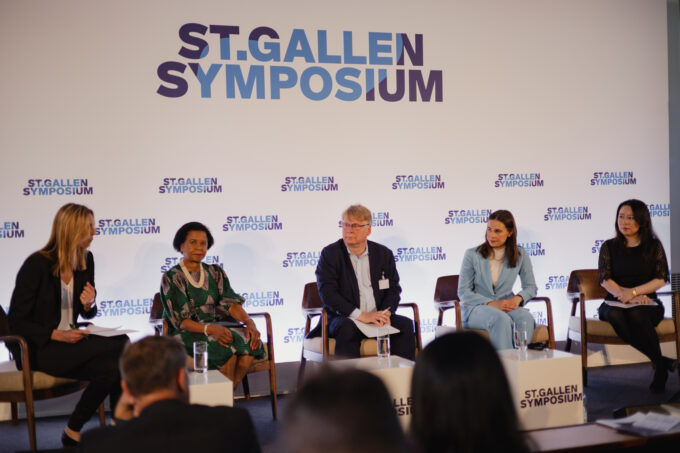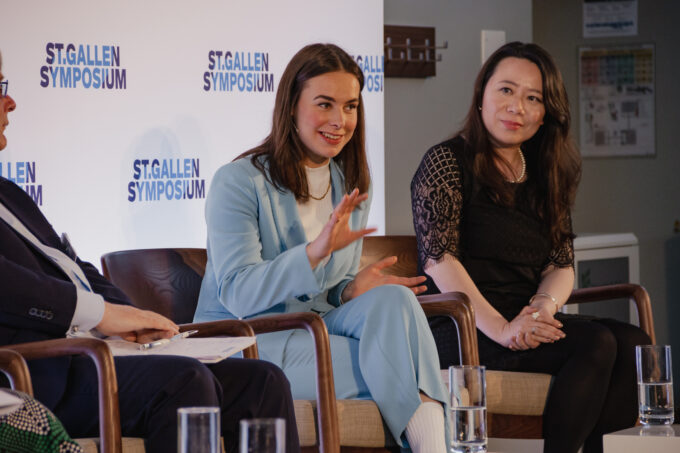
Don’t believe the hype: Making good use of a blackout
The Spanish blackout of April 2025 is an opportunity to strengthen electricity systems that have higher shares of renewables and should not be used as an excuse to slow down the energy...

by Julia Binder Published May 5, 2023 in Sustainability • 6 min read
Companies today are on the horns of a very 21st–century dilemma. They are caught between grappling with short-term priorities, caused by supply–chain disruptions, inflation, and anaemic economic conditions, while trying to address more long-term impacts, such as global warming and intergenerational equity.
At the St. Gallen Symposium, I had the pleasure of moderating a panel entitled “Long-termism, now!”, which was part call-to-action, part diagnostic session on that very dilemma. Just to help frame what we are dealing with in terms of short and long term, one of my panelists, Martin Reeves, Chairman of the BCG Henderson Institute, explained that we are trying to figure out this dilemma at a time when technology has reduced timescales to an “algorithmic” scale, requiring businesses to make decisions in increasingly shorter time spans.
Lin Yue, Executive Director, Goldman Sachs Asset Management, illustrated the scale of what long-term means by looking at how long it might take to achieve gender equality. Before the pandemic, it would take over 100 years. After the pandemic, it would take more than 130 years, she said.
So, the big question on my mind at the start, which I put to my panelists, was: “Why is it so difficult for us to reconcile the short and long term in our thinking, strategizing and managing?”
For Mamphela Ramphele, Co-President of the Club of Rome, known since the 1970s for its work on finding holistic solutions to long-term problems, the answer boiled down to two things: mindset and fear of the unknown.

Mindset, she explained, requires a fundamental shift in thinking, as the world we have created cannot be solved with the same thinking as that which created it. “We require a substantially different way of new thinking if humanity is to survive,” she said.
A big part of that mindset is embracing the values of dignity, empathy and compassion. “In my experience, long-termism starts with each and every one of us doing the hard work of reconfiguring what it means to be human,” Ramphele said, referring to her upbringing in an African village where these three “universal values” were embedded in people’s lives.
Culture change is then needed to “release people from the bondage of fear, so they can have new ways of thinking for radical systems and cultural change for future generations,” she argued.
In the business world, the lens through which Yue chose to assess the topic, there was a trade-off between profitability and sustainability. Indeed, businesses were not structurally aligned to take a long-term approach to sustainability due to three factors, she said.
One is that companies are being judged on their quarterly earnings performance. Two, related to this, longer-term measures are harder to evaluate. “We know that we need more trust and collaboration, but what does it look like to have 10% more trust and collaboration?” Yue asked.
The third factor is siloed cultures. Today’s organizations are built, by design, for specialization. But when it comes to tackling complex challenges related to long-term sustainability, “cross-divisional” collaboration is hard, Yue explained. “We have all responded to what is more urgent, rather than what is more important,” she suggested to the audience.
For Reeves, the solution to dealing with this “structural misalignment” required a blending of different ways of thinking. “The dominant mode of thinking in business is analytical planning, or dialectical thinking, but the unprecedented problems and solutions for the long term need this to be supplemented by imagination,” he said.
Release people from the bondage of fear, so they can have new ways of thinking for radical systems and cultural change for future generations- Mamphela Ramphele, Co-President of the Club of Rome
We can also learn from children. Child play teaches us lessons; it is spontaneous and de-risked. “Would you describe the environments of most corporates today as intellectually playful? Probably not. But there are things that leaders can do to make counter-factual thinking safe. We can remove fear from a situation, we can introduce humor into a situation,” Reeves said.
Yet ultimately, it may be a mistake to focus on business separately from society, Ramphele cautioned. “What is missing is the human consciousness that’s needed to break down the barriers to imagining a different future and ways of doing things —different norms, different measurements — but importantly, the consciousness that everything is connected to everything else.”
Inclusivity was also a key part of it, Yue argued, pointing out that diversity of views leads to better collaboration. That leads to examining how organizations are set up in terms of gender diversity, with many originally established with the idea of a male, white profile in mind, and they are still dominated by this profile.
“This is how the current system is set up, it defaults to a particular group of people and helps mobilize them to become leaders – and this is not a way to set us up for long-term sustainability. [Women] having a seat at the table is not enough. In order to build long-term sustainability, we need to build a brand-new table,” Yue said.
Inclusion was needed to make the right long-term decisions, agreed Gyri Reiersen, Co-Founder and CPO of Tanso, a German company that develops carbon accounting software. “It’s uncomfortable to invite people into the room who have different opinions. We see this particularly with the leaders of today. Your job is not necessarily to make decisions because you are likely to be blind to a couple of key aspects.”
I was then curious to ask what the role of technology could be in creating some “long-termism”. Was artificial intelligence our friend or our foe?

Reiersen believed that we won’t get there “unless we have intelligent systems supporting us” — for forecasting, for instance. “We are dependent on it. We need to leverage it,” she said. But she cautioned that while there was a clear need to reimagine the future using AI, we also had to be cautious because of the biases inherent in its use of historical data.
None of this is unsurmountable, Reeves said, pointing out that large projects like this involve failure, too. He suggested a handful of principles to guide actions that business leaders can take. The first is to set yourself “impossible goals” to push your organization beyond merely incremental improvements. Then, implement plans that you recognize will necessarily evolve, while providing different options to stay agile in a quickly changing environment.
The next is to ensure a drumbeat of activity. “With the most complicated problems like gender equality and climate change you can’t say ‘this is what you do to solve it’. You can say ‘we’ll try something and we’ll probably fail then we’ll try something else’. But you have to keep moving,” Reeves said, adding simplicity, or keeping it simple, to the list.
The last principle is what he called external mobilization. “This is leadership around a purpose that mobilizes other human actors,” Reeves explained.
Yet once again Ramphele brought us back to what I think is the essence of the solution: the human side, specifically leveraging human connectivity, communication and empathy.
“We need to transform the rules, the structures, and the way we think about who we are. Long-termism will not come as a process, it will have to come from systems and cultural change.”

Professor of Sustainable innovation and Business Transformation at IMD
Julia Binder, Professor of Sustainable Innovation and Business Transformation, is a renowned thought leader recognized on the 2022 Thinkers50 Radar list for her work at the intersection of sustainability and innovation. As Director of IMD’s Center for Sustainable and Inclusive Business, Binder is dedicated to leveraging IMD’s diverse expertise on sustainability topics to guide business leaders in discovering innovative solutions to contemporary challenges. At IMD, Binder serves as Program Director for Creating Value in the Circular Economy and teaches in key open programs including the Advanced Management Program (AMP), Transition to Business Leadership (TBL), TransformTech (TT), and Leading Sustainable Business Transformation (LSBT). She is involved in the school’s EMBA and MBA programs, and contributes to IMD’s custom programs, crafting transformative learning journeys for clients globally.

July 9, 2025 • by Cédric Philibert in Sustainability
The Spanish blackout of April 2025 is an opportunity to strengthen electricity systems that have higher shares of renewables and should not be used as an excuse to slow down the energy...

July 7, 2025 • by Julia Binder, Esther Salvi in Sustainability
Lindström found that expanding its business to Asia required overcoming cultural barriers as much as building new services and infrastructure while adapting itself to local needs. ...

June 16, 2025 • by Núria Ibáñez-García in Sustainability
Driving change in a system where progress can be slow and regulation is tight isn’t easy. But for Núria Ibáñez-García, sustainable transformation starts with steady influence, applied from within. ...

June 9, 2025 • by Julia Binder, Esther Salvi in Sustainability
Dr. Kiri Trier, the beauty giant’s regional sustainability chief, explains her drive to change customer habits and make cutting waste, refilling, and recycling part of their daily bathroom routine....
Explore first person business intelligence from top minds curated for a global executive audience